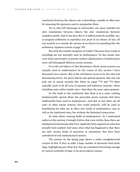translation between the objects one is describing—usually in effect just by renaming the operators used to manipulate them.
Yet to take full advantage of universality one must consider not only translations between objects but also translations between complete proofs. And if one does this it is indeed perfectly possible, say, to program arithmetic to reproduce any proof in set theory. In fact, all one need do is to encode the axioms of set theory in something like the arithmetic equation system of page 786.
But with the notable exception of Gödel's Theorem these kinds of encodings are not normally used in mathematics. So this means that even when universality is present realistic idealizations of mathematics must still distinguish different axiom systems.
So in the end what is it that determines which axiom systems are actually used in mathematics? In the course of this section I have discussed a few criteria. But in the end history seems to be the only real determining factor. For given almost any general property that one can pick out in axiom systems like those on pages 773 and 774 there typically seem to be all sorts of operator and multiway systems—often including some rather simple ones—that share the exact same property.
So this leads to the conclusion that there is in a sense nothing fundamentally special about the particular axiom systems that have traditionally been used in mathematics—and that in fact there are all sorts of other axiom systems that could perfectly well be used as foundations for what are in effect new fields of mathematics—just as rich as the traditional ones, but without the historical connections.
So what about existing fields of mathematics? As I mentioned earlier in this section, I strongly believe that even within these there are fundamental limitations that have implicitly been imposed on what has actually been studied. And most often what has happened is that there are only certain kinds of questions or statements that have been considered of real mathematical interest.
The picture on the facing page shows a rather straightforward version of this. It lists in order a large number of theorems from basic logic, highlighting just those few that are considered interesting enough by typical textbooks of logic to be given explicit names.




